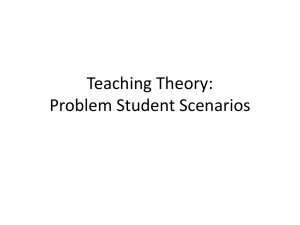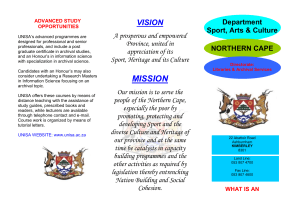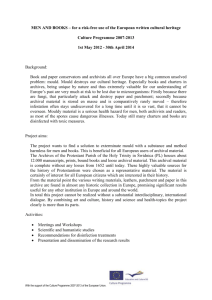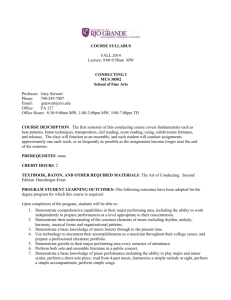Digital Here Now, Maybe Forever? Collecting and Collaborations
advertisement
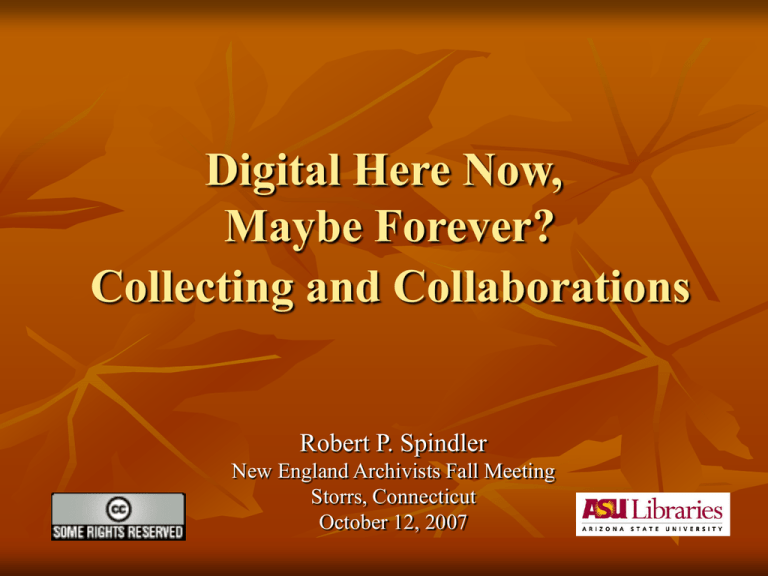
Digital Here Now, Maybe Forever? Collecting and Collaborations Robert P. Spindler New England Archivists Fall Meeting Storrs, Connecticut October 12, 2007 Archivists and Collaboration Why can’t we go it alone? Creators and digital obsolescence Lack of professionally managed infrastructure Need for specialized technology expertise Need for authority/executive champion(s) Archivists and Collaboration The Plan (for the next 40 mins. or so): Collaboration with creators Quick university case studies What should we say to them? What motivates them? Enterprise systems Learning management systems Electronic theses and dissertations Lessons Learned Archivists and Creators What should we discuss with them? Articulate the digital preservation challenge Identify sustainable formats – run with pack! Discuss production workflow Documentation of ownership (collaborations) Transfer to archival system/reliable infrastructure Archivists and Collaboration Creators are motivated by different things: Enterprise system content owners are business/transaction driven Faculty are interested in tenure and time Students are motivated by program requirements How can we speak to their needs? Case Study: Enterprise Student Information System (2006-07) New SIS to be implemented in 18 months Student transcripts are vital records Archivist comments to CIO’s Wiki Registrar is supportive but not committed PESC XML Standard http://www.pesc.org/info/approved/xml-post-transcript.asp Meeting with project co-leaders Case Study: Enterprise Student Information System (2007) Case Study: Learning Management Systems (2003) General Counsel called committee with reps from: Faculty University IT University Archives Case Study: Learning Management Systems (2003) Counsel interested in rights management, privacy and public records compliance University IT interested in deleting obsolete files and avoiding migration costs University Archives interested in preserving sample courses for pedagogy and history Faculty wants to keep everything Case Study: Learning Management Systems (2003) Group identified course components and content lifespan through a flow chart Taxonomy of course components drafted with proposed retention periods for each Active Course Reuseable Course/Content migrated to new/current LMS software if necessary to re-offer Non-reuseable/non-archival Hold in temporary queue for destruction IT deletes on schedule Gradebooks retained one year after Fall Semester of academic year last offered Balance of course deleted 3 years from Fall Semester of academic year last offered Determine responsibility for Content (faculty, department, etc.) – identify “owner” Determine responsibility for Hosting “bits” (college, IT, DLT, etc.) Determine re-use schedule/determine reuse status (is the course to be re-offered) Add metadata to course record and send to temporary storage facility (along with permissions documentation and collateral information) Move to temporary storage Inactive Course/Content Store in temporary review facility (Duration?) Retained in LMS software Content “Owner” selects reuseable course/content Archivist selects archival course/content Update course record Faculty Personal Copy Migrate to nonBlackboard format TBA Store on Local hard drive/CD/DVD Strip student ID#’s from gradebook Licensed content flagged and/or stripped Archival course/content Migrate to archival nonBlackboard format TBA Strip gradebooks Move to long term storage Update course record Maintenance, quality control Description and access to integrate into permanent collection Record Series Syllabus Grade Book Exam Questions/Key Completed Exams Lecture Content Assignments Required Course Readings (and links to) Discussion Boards/Email: Class section Work Group Chat Bibliographies/References/Links Video Clips Audio Clips Announcements Student Portfolio Class Attendance Records Class Schedule System Access Records (Virtual Attendance) Links with Student Information System Records Default Retention 3 yrs after fall semester last offered 1 yr. after FY offered 1 yr. after FY offered 1 yr. after FY offered 3 yrs. After fall semester offered 1 yr. after FY offered Format/Notes Selective archival retention: Word/Text 1 yr. after FY offered 1 yr. after FY offered 1 yr. after FY offered 3 yrs. after fall semester last offered Grade appeal policy. FERPA? Grade appeal policy. FERPA? Grade appeal policy. FERPA? 0 perm 1 yr. after FY offered 0 1 yr. after FY offered 0 Grade appeal policy. FERPA Grade appeal policy If not returned to student FERPA Selective archival retention: Word/Text Grade appeal policy FERPA Dependent on licensing Evaluate annually, licensing? Evaluate annually, licensing? Delete at end of semester Grade appeal policy FERPA Delete at end of semester Grade appeal policy FERPA Delete after data transfer to SIS at end of semester? DRAFT Taxonomy of potential record series within a specific online course offering with possible disposition, policy and legal jurisdictions. Rob Spindler, Arizona State University, 12/2/2003 Case Study: Learning Management Systems (2003) Group disbanded in Spring 2004 Faculty could not see the justification for deletion of anything Case Study: ASU Electronic Theses and Dissertations Working Group (2001) 22 faculty, librarians, IT staff, Graduate College administrators, + one archivist. Proposed: PDF requirement and optional multimedia Student self-submission process Multimedia format standards Funding for IT and Graduate College staff Case Study: ASU Electronic Theses and Dissertations Working Group (2001) Technology staff (University and Library): Builds submission interface Maintains storage environment Researches migration paths and tests migrations Librarians review and enhance author-provided metadata Archivists evaluate preservation and recordkeeping requirements Case Study: ASU Electronic Theses and Dissertations Working Group (2001) Standards committee receives format standards proposals from students via GC advisors Center for Learning and Teaching Excellence to provide student training University was unable or unwilling to support the true costs Conclusion: Lesson Learned All of these initiatives failed! We have a responsibility to keep trying Be strategic – pick your spots Executive champions are the key: Provosts Counsel Auditors CIOs and Library Deans Thanks! Digital Here Now, Maybe Forever? Collecting and Collaborations Robert P. Spindler New England Archivists Fall Meeting Storrs, Connecticut October 12, 2007
